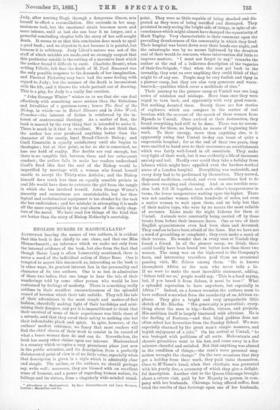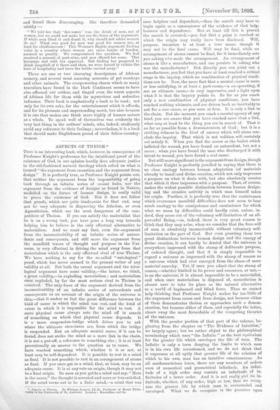ENGLISH NURSES IN MASHONALAND.* ALTHOUGH bearing the names of two
authors, it is evident that this book is due chiefly to one alone, and that one Miss Blennerhassett ; an inference which we make not only from the internal evidence of the book, but also from the fact that though Sister Lucy is often honourably mentioned, there is never a word of the individual action of Sister Rose. One is tempted to regret this inasmuch as, interesting as the book is in other ways, its greatest interest lies in the personality and character of its two authors. One is so lost in admiration of these two ladies, that one longs to hear the tale of their wanderings told by some other person who would be less restrained by feelings of modesty. There is something really sublime in their manifest unconsciousness of the splendid record of heroism which their tale unfolds. They tell the tale of their adventures in the most simple and matter-of-fact fashion, cheerfully making light of their hardships and mini- mising their dangers, and yet it is impossible not to think that their survival of some of their experiences was little short of a miracle, and that they owed their safety to nothing else but their indomitable pluck and spirit. In spite, however, of the authors' modest reticence, we fancy that most readers will find the chief charm of their work to consist in its record of what a brave woman dare do and can do. Nevertheless, the book has many other claims upon our interest. Mashonaland is a country which occupies a very prominent place just now in the public attention, and its description from a perfectly disinterested point of view is of no little value, especially when that description is given in a style which is admirably clear and simple. The author, or the authors, we should perhaps say, write well ; moreover, they are blessed with an excellent sense of humour, and a power of regarding human nature, its failings and its virtues, from a singularly wide-minded stand- _ * Adventures in Mashonaland. By Rom Blennerhassett and Lucy Sleeman. London : Moor:Allan and Co. point. They were as little capable of being shocked and dis- gusted as they were of being terrified and dismayed. They persisted in only seeing the bright side of things, in spite of cir- cumstances which might almost have damped the equanimity of Mark Tapley. Very characteristic is their comment upon the prevailing drunkenness of the community in which they lived. Their hospital was burnt down over their heads one night, and the catastrophe was by no means lightened by the drunken zeal of their would-be rescuers, whose intervention did little to improve matters. " I must not forget to say," remarks the author at the end of a ludicrous description of the vagaries of their fire-brigade, "that when the men got back to the township, they sent us over anything they could think of that might be of any use. People may be very foolish and tipsy in a pioneer camp, but they are also very generous and warm-. hearted,—qualities which cover a multitude of sins," Their journey to the pioneer camp at Umtali was one long series of mistakes and mishaps. More than once they were urged to turn back, and apparently with very good reason, But nothing daunted them. Surely there are few stories of explorers which can compare in the matter of real heroism with the account of the march of these women from Mpanda, to Umtali. Once arrived at their destination, they found everything had still to be done. There was no accom- modation for them, no hospital, no means of beginning their work. To their energy, more than anything else, is it apparently owing that Umtali to-day can boast of quite a respectable hospital ; for at the end of their two years, they were enabled to band over to their successors an establishment which was fairly well-found in all essentials. They make very light of their work, but it was evidently a life of incessant anxiety and toil. Hardly ever could they take a holiday from labours which might have appalled even the hardest-worked nurse of a London hospital. Everything was makeshift, and every duty had to be performed by themselves. They nursed, dispensed medicines, cooked, and even sometimes had to do their own sweeping and cleaning. And on one terrible occa- sion both fell ill together, took each other's temperatures in turns, the lower temperature waiting upon the higher. There was not another woman within hundreds of miles, not even a native woman to wait upon them, and no help but that of their native boys, who were by no means the most reliable of servants. Lions made the night hideous for them at Umtali. Animals were constantly being carried off by these beasts from before their insecure doors. One or two of their English acquaintances even had been slain and devoured. They confess to have been afraid of the lions. But we have not a word of grumbling or complaint ; they even make a mock of their terrors. No wonder that in every man at Umtali they found a friend. In all the pioneer camp, we think, there could hardly have been found two better men than these two women. The camp was on the high-road to the Company's forts, and interesting travellers paid them an occasional passing visit, Mr. Selous among them. "He is known throughout Africa as the man who never tells a. lie. If we were to make the most incredible statement, adding, ' Selous told me so,' people would say, This is a. hard saying, but, if you heard it from Selous, it must be true l' What a splendid reputation to have anywhere, but especially in Africa 1" Indeed, on a former occasion the authors seem to have suffered somewhat from the mendacity of an African ex- plorer. They give a bright and very sympathetic little sketch of Mr. Rhodes. " His generosity is proverbial ; every- thing about the man is big,—faults, virtues, and projects. His ambition itself is largely tinctured with altruism. He is the darling of Fortune,—and that blind goddess does not often select her favourites from the Sunday School. We were especially charmed by the great man's simple manners, and boyish enjoyment of a joke." On his arrival at Umtali, " he was besieged with petitions of all sorts. Malcontents and chronic grumblers went to his hut, and came away in a few minutes cheerful and satisfied. Not that anything was altered in the condition of things,—the man's mere personal mag- netism wrought the change." On the rare occasions that they got a holiday from their work, they paid visits themselves. Once to M'Tassa's kraal, when that chieftain was presented with his yearly due, a ceremony of which they give a delight- ful description. Another visit to the Queen Ohiconga brought about a return visit, paid by her Majesty in person, in com- pany with her husbands. Ohiconga being offered coffee, first tried the results of that beverage upon one of her husbands, and found them discouraging. She therefore demanded whisky:— "We told her that fire-water' was the drink of men, not of women, but we could not make her see the force of the argument. If white men liked it and drank it, why should not white women do so ? What was good for men was good for women too, at least for chieftainesses ! This Woman's Rights argument finding voice in a country where women are mere beasts of burden, amused us greatly. We compromised the question. We had received a present of port-wine, and now offered her some. This beverage met with her approval. But finding her prepared to drink mugsfull of it there and then, we were forced to violate the laws of hospitality and have the bottle carried away."
There are one or two charming descriptions of African scenery, and several most amusing accounts of pet monkeys and other animals. The overpowering charm which so many travellers have found in the Dark Continent seems to have also affected our author, and tinged even the worst aspects of African life for them with its mysterious and seductive influence. Their book is emphatically a book to be read ; not only for its own sake, for the entertainment which it affords, and for its pleasant and unpretending merit, but also because it is one that makes one think more highly of human nature as a whole. To speak well of themselves was evidently the very last thing in the authors' minds, who, indeed, studiously avoid any reference to their feelings ; nevertheless, it is a book that should make Englishmen proud of their fellow-country- women.







































 Previous page
Previous page